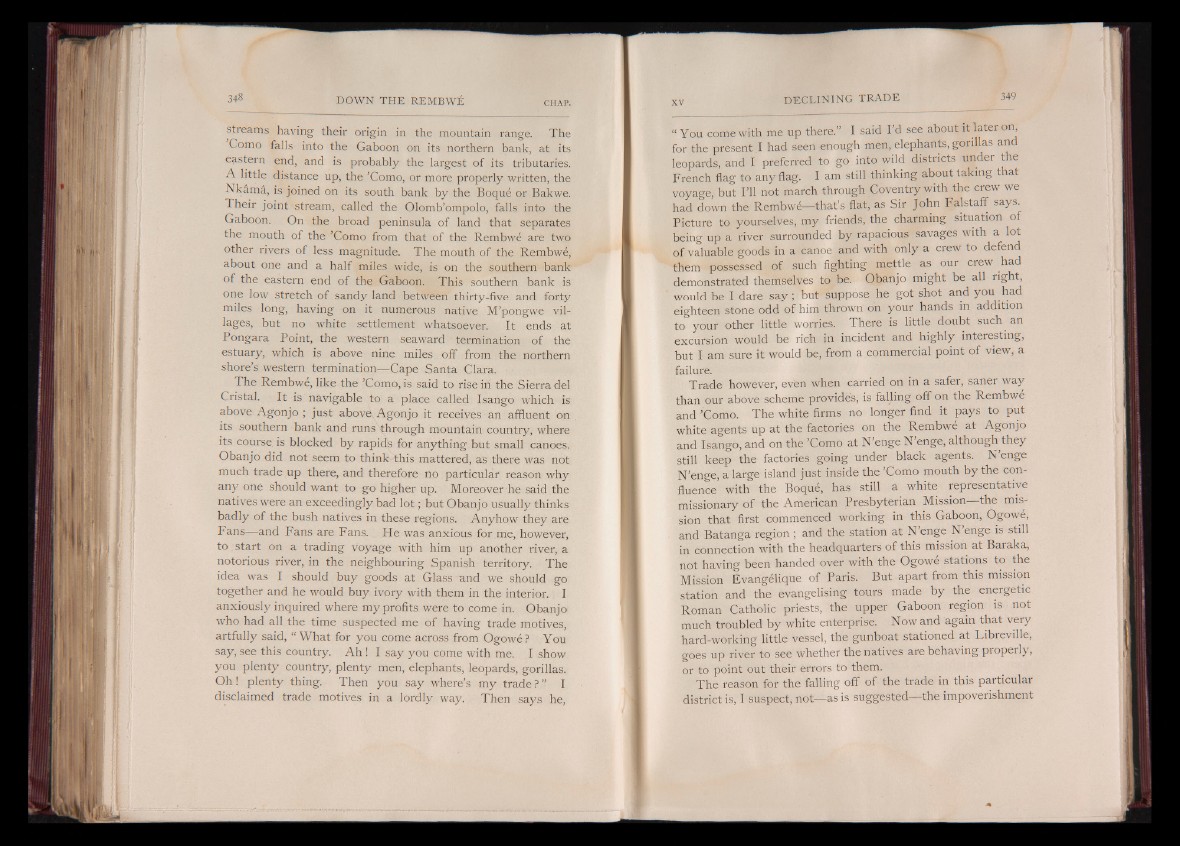
streams having their origin in the mountain range. The
Como falls into the Gaboon on its northern bank, at its
eastern end, and is probably the largest of its tributaries.
A little distance up, the ’Como, or more properly written, the
Nkama, is joined on its south bank by the Boque or Bakwe.
Their joint stream, called the Olomb’ompolo, falls into the
Gaboon. On the broad peninsula of land that separates
the mouth of the ’Como from that of the Rembwe are two
other rivers of less magnitude. The mouth of the Rembw6,
about one and a half miles wide, is on the southern bank
of the eastern end of the Gaboon. This southern bank is
one low stretch of sandy land between thirty-five and forty
miles long, having on it numerous native M’pongwe villages,
but no white settlement whatsoever. It ends at
Pongara Point, the western seaward termination of the
estuary, which is above nine miles off from the northern
shore’s western termination— Cape Santa Clara.
The Rembwe, like the ’Como, is said to rise in the Sierra del
Cristal. It is navigable to a place called Isango which is
above Agonjo ; just above, Agonjo it receives an affluent on
its southern bank and runs through mountain country, where
its course, is blocked by rapids for anything but small canoes.
Obanjo did not seem to think this mattered, as there was not
much trade up there, and therefore no particular reason why
any one should want to go higher up. Moreover he said the
natives were an exceedingly bad lo t ; but Obanjo usually thinks
badly of the bush natives in these regions. Anyhow they are
Fans— and Fans are Fans. He was anxious for me, however,
to start on a trading voyage with him up another river, a
notorious river, in the neighbouring Spanish territory. The
idea was I should buy goods at Glass and we should go
together and he would buy ivory with them in the interior. I
anxiously inquired where my profits were to come in. Obanjo
who had all the time suspected me of having trade motives,
artfully said, “ What for you come across from Ogowe ? You
say, see this country. Ah ! I say you come with me. I show
you plenty country, plenty men, elephants, leopards, gorillas.
O h ! plenty thing. Then you say where’s my trade ? ” I
disclaimed trade motives in a lordly way. Then says he,
“ You come with me up there.” I said I’d see about it later on,
for the present I had seen enough men, elephants, gorillas and
leopards, and I preferred to go into wild districts under the
French flag to any flag. I am still thinking about taking t at
voyage, but I’ll not march through Coventry with the crew we
had down the Rembwé— that’s flat, as Sir John Falstaff says.
Picture to yourselves, my friends, the charming situation of
being up a river surrounded by rapacious savages with a lot
of valuable goods in a canoe and with only a crew to defend
them possessed of such fighting mettle as our crew had
demonstrated themselves to be. Obanjo might be all right,
would be I dare say ; but suppose he got shot and you had
eighteen stone odd of him thrown on your hands in addition
to your other little worries. There is little doubt, such an
excursion would be rich in incident and highly interesting,
but I am sure it would be, from a commercial point of view, a
failure.
Trade however, even when carried on in a safer, saner way
than our above scheme provides, is falling off on the Rembwe
and ’Como. The white firms no longer find it pays to put
white agents up at the factories on the Rembwé at Agonjo
and Isango, and on the ’Como at N’enge N’enge, although they
still keep the factories going under black agents. N enge
N’enge, a large island just inside the ’Como mouth by the confluence’
with the Boqué, has still a white representative
missionary of the American Presbyterian Mission' the mis-1
sion that first commenced working in this Gaboon, Ôgowé,
and Batanga region ; and the station at N’enge N’enge is still
in connection with the headquarters of this mission at Baraka,
not having been handed over with the Ogowé stations to the
Mission Évangélique of Paris. But apart from this mission
station and the evangelising tours made by the energetic
Roman Catholic priests, the upper Gaboon region is not
much troubled by white enterprise. Now and again that very
hard-working little vessel, the gunboat stationed at Libreville,
croes up river to see whether the natives are behaving properly,
. • -I or to point out their errors to them.
The reason for the falling off of the trade in this particular
district is, I suspect, not— as is suggested— the impoverishment